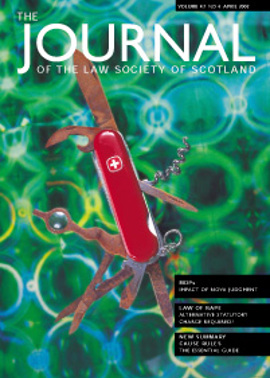Maintaining the value of trust
Whatever truths may eventually emerge out of the Enron debacle, one of the worrying repercussions which I have seen in the Scottish press recently are editorials which indicate that professional advisers, including accountants, merchant banks and lawyers, are losing or indeed may have lost the trust of the public. While one could dismiss such editorial as journalistic hyperbole, I believe it is a sobering and salutary opportunity to re-emphasise the place of trust and ethics in the current business environment for professional services.
Leaders of commercial law firms could be forgiven for having driven their firms, their partners and their lawyers towards better standards of client service throughout the 1980’s and 1990’s. This service has been typified by legal firms who look for solutions to client problems, who adopt a “can do” mentality and who seek to align the interests of their lawyers with the interest of the client and to make the client feel that the legal team is very much “on their side”.
However admirable this approach is within the context of providing proactive legal solutions, leaders of law firms must also remember that they are in the business of providing their clients with clear and objective advice. By association with the client, the law firm represents that client to other professionals, to funders, the courts and to regulators as a company advised by a firm which has an adherence to certain professional standards and ethics. As jealously as the law firm guards its relationship with its client and seeks to exceed the client’s needs and expectations it must even more jealously guard its own reputation, professional standards and trust.
In the modern commercial world when advising corporates, law firms need to consider which stakeholder is ultimately, legally, morally and commercially their client: the instructing project manager, the client’s board of directors, the client’s shareholders, its regulators and its creditors. All these parties will have a legitimate interest in ensuring that the client acts is accordance with the law. Their interests will often be in harmony, but not always. Commercial law firms in the 21st century need to be alert to these conflicts.
Here again the 21st century creates a multi-layered approach to the problems of trust and professional standards where advising the corporate client as to compliance with “the law”. Compliance with primary and secondary legislation is self evident but what of compliance with the developing codes of “best practice” or “market custom”, or voluntary codes in connection with environmental or social responsibility? If trust and compliance with appropriate and relevant legal and professional standards and expectations lie at the heart of a legal firm’s reputation (and I would submit that they must) the lesson at the dawn of the 21st century must be that firms must strive to maintain clear and visible adherence to the highest reputation of professional standards and trust. This, in turn, will attract clients who wish to operate on that level and, through acting for them; the law firm reinforces its reputation and standing. This creates a “virtuous circle” of trust and reputation.
While I have spoken of this in the context of a commercial law firm with which I am most familiar, it has always been my belief that adherence of professional standards, ethics and integrity (for all of which I here substitute “trust”) are at the essence of what we do as a legal profession. It is trust that lubricates the wheels of the court system; it is the guardian on the advocates boxes at the Court of Session; it is the essence of the values and understanding that can help transactions between solicitors operate in an efficient and effective manner to speed up the delivery of solutions for clients. We will lose trust at our peril. I well remember having a small role to play in a large city-based transaction towards the beginning of the early 90’s where clearly the trust between the respective clients and the respective London firms (of which there were about 16 in all) had disintegrated during the course of the transaction. The completion meeting consequently took three days to effect as each party insisted on reading each and every completion document from beginning to end, cross checking against previous drafts.
In an era of what I might refer to as “competitive professionalism”, law firms must remain alert to ensuring that they compete, both for themselves and their clients, in the legitimate areas of quality of legal argument, quality of legal service, facilitating knowledge transfer, state of the art technology and the ability to understand and interpret the clients’ needs, spoken and unspoken. We must be resolute however in a collective adherence to professional standards and ethics. Law firms that share such adherence will enjoy a vital competitive edge to doing business.
In this issue
- Reflection on the law of rape
- MDPs compromise core values
- Maintaining the value of trust
- Website reviews
- Scheme for accounting for counsel’s fees
- Keeper’s corner
- Clause 13: unlucky for some?
- The new summary cause and small claim rules
- AGM report
- Fairness – apparent and otherwise
- Risk management roadshow review
- Strangled by red tape?
- Changes in special educational needs
- Scottish Solicitors’ Discipline Tribunal 2002
- Europe
- Book reviews






